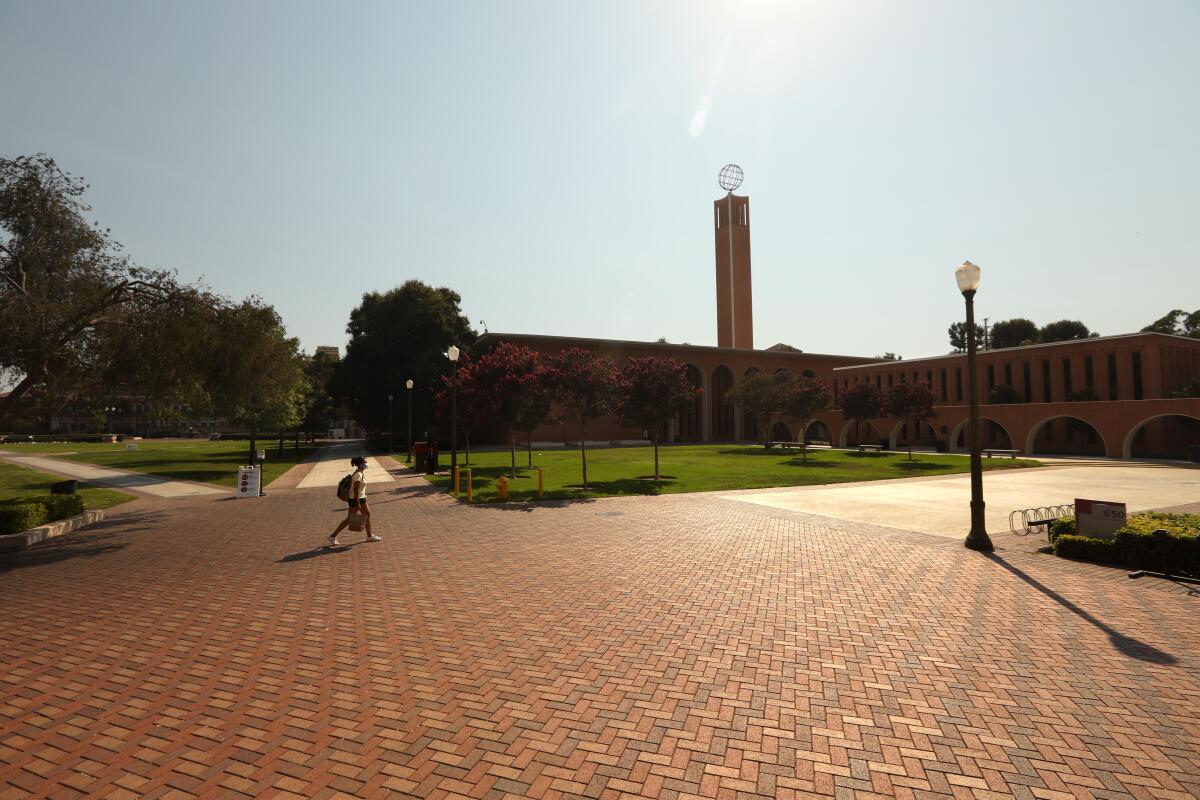Controversy over USC professor’s use of Chinese word that sounds like racial slur in English

A business professor at USC is no longer teaching his communications course after Black students complained that a Chinese-language example he used during class sounded like a racial slur and harmed their mental health.
Marshall School of Business professor Greg Patton was giving a Zoom lesson in his “Communication for Management” class on Aug. 20. The course, a three-week intensive, is part of the core requirements for first-year master’s of business administration students.
Patton’s resume describes him as “an expert in communication, interpersonal and leadership effectiveness” who has taught and led programs in the Pacific Rim for more than 20 years.
That day’s lesson focused on building confidence and improving presentation skills, according to a class syllabus. When Patton, who is white, began discussing the use of filler words like “um” and “er” in speech, he offered an international example.
“Like in China the common word is ‘that’ — ‘that, that, that, that,’” he said, according to video recordings of the class circulated on social media. “So in China it might be ‘nèi ge’ — ‘nèi ge, nèi ge, nèi ge.’ So there’s different words that you’ll hear in different countries, but they’re vocal disfluencies.”
Patton was referring to 那个,which in Mandarin is commonly pronounced nèi ge (NAY-guh) or nà ge (NAH-guh). He was using the former pronunciation.
To some students, the word sounded like the N-word in English. The next day a group of Black master’s candidates in the class of 2022 wrote a letter to Marshall Dean Geoffrey Garrett.
“There are over 10,000 characters in the Chinese written language and to use this phrase ... is hurtful and unacceptable to our USC Marshall community,” the letter said. “The negligence and disregard displayed by our professor was very clear.”
The students said their mental health had been affected and they were unable to focus on their studies.
“To expect that we will sit through two more weeks of this class, knowing that the professor lacks the tact, racial awareness and empathy to lead and teach an audience as diverse as ours is unacceptable,” they wrote.
Chinese speakers say the Mandarin word is widely used as a place filler like the English “um.” It can also be used to indicate a specific item, as in “that one,” with the pronunciation varying depending on the proximity of the item.
Language learners and English speakers have long commented on the similarity in pronunciation between this common Mandarin word and the racial slur in English. It has been the subject of language blogs, YouTube tutorials and comedy skits.
In an email to all MBA students on Aug. 24, Garrett said that Patton “repeated several times a Chinese word that sounds very similar to a vile racial slur in English.”
“Understandably, this caused great pain and upset among students, and for that I am deeply sorry,” Garrett wrote. “It is simply unacceptable for faculty to use such examples or language in class because they can marginalize and harm you and hurt your feelings of psychological safety. As a school, we must and we will do better.”
He said he would work with vice deans and other administrators to address any problems of bias, microaggressions or inequities.
In a statement, the school said Patton “agreed to take a short-term pause” from teaching the course, and another instructor took over. Patton continues to teach his other courses.
“We acknowledge the historical, cultural and harmful impact of racist language ... USC is committed to building a culture of respect and dignity where all members of our community can feel safe, supported, and can thrive,” the statement said.
Patton did not respond to requests for comment. But in an Aug. 26 letter sent to the Marshall Graduate Student Assn., he offered students an apology — and a defense.
“I have strived to best prepare students with global, real-world and applied examples and illustrations to make the class content come alive and bring diverse voices, situations and experiences into the classroom,” he wrote.
Patton said in the letter that he had taught the course for 10 years and received positive feedback when using the same example in the past.
“Yet, I failed to realize all the many different additional ways that a particular example may be heard across audiences members based on their own lived experiences and that is my fault,” he wrote.
This week a group of nearly 100 USC alumni, most of whom are Chinese by ethnicity or nationality, wrote to the school’s administration in support of their professor, saying his use of the Mandarin word for “that” was accurate and “an entirely appropriate and quite effective illustration of the use of pauses.”
The alumni said they were “deeply disappointed that the spurious charge has the additional feature of casting insult toward the Chinese language, the most spoken in the world, and characterized it and its usage as vile.”
“We feel Marshall should be open to diversity in all areas,” they wrote.
Times Staff Writer Rong-Gong Lin II contributed to this report.
More to Read
Sign up for Essential California
The most important California stories and recommendations in your inbox every morning.
You may occasionally receive promotional content from the Los Angeles Times.











